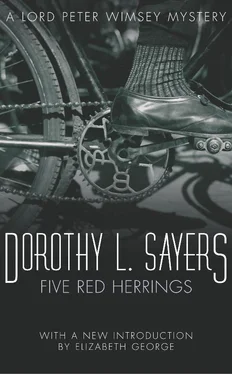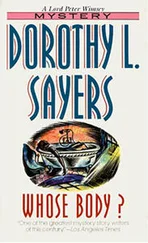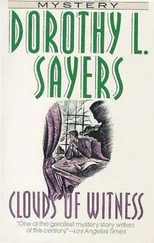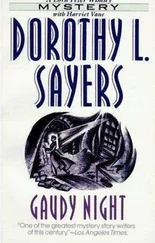Wimsey’s air of idleness had left him. His long and inquisitive nose seemed to twitch like a rabbit’s as he turned the satchel upside down and shook it, in the vain hope of extracting something more from its depths. He rose, and searched the easel and the ground about the stool very carefully.
A wide cloak of a disagreeable check pattern lay beside the easel. He picked it up and went deliberately through the pockets. He found a pen-knife, with one blade broken, half a biscuit, another packet of cigarettes, a box of matches, a handkerchief, two trout-casts in a transparent envelope, and a piece of string.
He shook his head. None of these was what he wanted. He searched the ground again, casting like a hound on the trail, and then, still dissatisfied, began to lower himself gingerly down the smooth face of the rock. There were crannies here into which something might have fallen, clumps of bracken and heather, prickly roots of gorse. He hunted and felt about in every corner, stabbing his fingers again at every move and swearing savagely. Small fragments of gorse worked their way up his trouser-legs and into his shoes. The heat was stifling. Close to the bottom he slipped, and did the last yard or so on his hinderparts, which irritated him. At a shout from the top of the bank he looked up. The Sergeant was grinning down at him.
‘Reconstructing the accident, my lord?’
‘Not exactly,’ said Wimsey. ‘Here, wait just a moment, will you?’
He scrambled up again. The corpse was now laid as decently as possible on a stretcher, awaiting removal.
‘Have you searched his pockets?’ panted Wimsey.
‘Not yet, my lord. Time enough for that at the station. It’s purely a formality, ye ken.’
‘No, it’s not,’ said Wimsey. He pushed his hat back and wiped the sweat from his forehead. ‘There’s something funny about this, Dalziel. That is, there may be. Do you mind if I go over his belongings now?’
‘Not at all, not at all,’ said Dalziel, heartily. ‘There’s no sic a great hurry. We may as weel dew’t first as last.’
Wimsey sat down on the ground beside the stretcher, and the Sergeant stood by with a notebook to chronicle the finds.
The right-hand coat pocket contained another handkerchief, a Hardy catalogue, two crumpled bills and an object which caused the Sergeant to exclaim laughingly, ‘What’s this, lip-stick?’
‘Nothing so suggestive,’ said Wimsey, sadly, ‘it’s a holder for lead-pencil — made in Germany, to boot. Still, if that’s there, there might be something else.’
The left-hand pocket, however, produced nothing more exciting than a corkscrew and some dirt; the breast-pocket, only an Ingersoll watch, a pocket comb and a half-used book of stamps; and Wimsey turned, without much hope, to the trouser-pockets, for the dead man wore no waistcoat.
Here, on the right, they found a quantity of loose cash, the notes and coins jumbled carelessly together, and a bunch of keys on a ring. On the left, an empty match-box and a pair of folding nail-scissors. In the hip-pocket, a number of dilapidated letters, some newspaper cuttings and a small notebook with nothing in it.
Wimsey sat up and stared at the Sergeant.
‘It’s not here,’ he said, ‘and I don’t like the look of it at all, Dalziel. Look here, there’s just one possibility. It may have rolled down into the water. For God’s sake get your people together and hunt for it — now. Don’t lose a minute.’
Dalziel gazed at this excitable Southerner in some astonishment, and the constable pushed back his cap and scratched his head.
‘What would we be lookin’ for?’ he demanded, reasonably.
(Here Lord Peter Wimsey told the Sergeant what he was to look for and why, but as the intelligent reader will readily supply these details for himself, they are omitted from this page.)
‘It’ll be important, then, to your way o’ thinking,’ said Dalziel, with the air of a man hopefully catching, through a forest of obscurity, the first, far-off glimmer of the obvious.
‘Important?’ said Wimsey. ‘Of course it’s important. Incredibly, urgently, desperately important. Do you think I should be sliding all over your infernal granite making a blasted pincushion of myself if it wasn’t important?’
This argument seemed to impress the Sergeant. He called his forces together and set them to search the path, the bank and the burn for the missing object. Wimsey, meanwhile, strolled over to a shabby old four-seater Morris, which stood drawn well up on the grass at the beginning of the sheep-track.
‘Ay,’ said Constable Ross, straightening his back and sucking his fingers, preliminary to a further hunt among the prickles, ‘yon’s his car. Maybe ye’ll find what ye’re wantin’ in it, after all.’
‘Don’t you believe it, laddie,’ said Wimsey. Nevertheless, he subjected the car to a careful scrutiny, concentrated for the most part upon the tonneau. A tarry smear on the back cushions seemed to interest him particularly. He examined it carefully with a lens, whistling gently the while. Then he searched further and discovered another on the edge of the body, close to the angle behind the driver’s seat. On the floor of the car lay a rug, folded up. He shook it out and looked it over from corner to corner. Another patch of grit and tar rewarded him.
Wimsey pulled out a pipe and lit it thoughtfully. Then he hunted in the pockets of the car till he found an ordnance map of the district. He climbed into the driver’s seat, spread out the map on the wheel, and plunged into meditation.
Presently the Sergeant came back, very hot and red in the face, in his shirt-sleeves.
‘We’ve searched high and low,’ he said, stooping to wring the water from his trouser-legs, ‘but we canna find it. Maybe ye’ll be tellin’ us now why the thing is so important.’
‘Oh?’ said Wimsey. ‘You look rather warm, Dalziel. I’ve cooled off nicely, sitting here. It’s not there, then?’
‘It is not,’ said the Sergeant, with emphasis.
‘In that case,’ said Wimsey, ‘you had better go to the coroner — no, of course, you don’t keep coroners in these parts. The Procurator-Fiscal is the lad. You’d better go to the Fiscal and tell him the man’s been murdered.’
‘Murdered?’ said the Sergeant.
‘Yes,’ said Wimsey, ‘och, ay; likewise hoots! Murrrderrrd is the word.’
‘Eh!’ said the Sergeant. ‘Here, Ross!’
The constable came up to them at a slow gallop.
‘Here’s his lordship,’ said the Sergeant, ‘is of opeenion the man’s been murdered.’
‘Is he indeed?’ said Ross. ‘Ay, imph’m. And what should bring his lordship to that conclusion?’
‘The rigidity of the corpse,’ said Wimsey, ‘the fact that you can’t find what you’re looking for, these smears of tar on the Morris, and the character of the deceased. He was a man anybody might have felt proud to murder.’
‘The rigidity of the corpse, now,’ said Dalziel. ‘That’ll be a matter for Dr. Cameron.’
‘I confess,’ said the doctor, who had now joined them, ‘that has been puzzling me. If the man had not been seen alive just after 10 o’clock this morning, I would have said he had been nearer twelve hours dead.’
‘So should I,’ said Wimsey. ‘On the other hand, you’ll notice that that painting, which was put on with a quick-drying copal medium, is still comparatively wet, in spite of the hot sun and the dry air.’
‘Ay,’ said the doctor. ‘So I am forced to the conclusion that the chill of the water produced early rigor.’
‘I do not submit to force,’ said Wimsey. ‘I prefer to believe that the man was killed about midnight. I do not believe in that painting. I do not think it is telling the truth. I know that it is absolutely impossible for Campbell to have been working here on that painting this morning.’
Читать дальше












